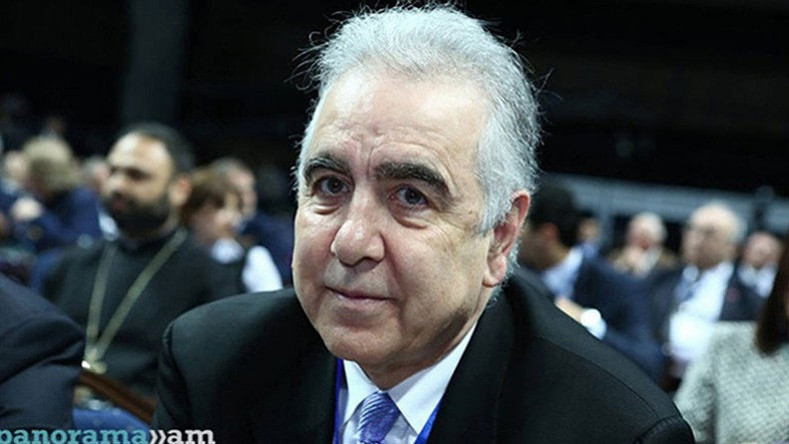
Turkey bans entry of foreigners who criticize President Erdogan
By Harut Sassounian
Publisher, The California Courier
The Turkish government, led by the autocratic leader Recep Tayyip Erdogan, has banned the entry of over 100,000 foreigners from 150 countries, including journalists and academics, just because they have expressed views critical of the government.
This is a violation of the most basic principle of democracy -- freedom of expression. This is also a violation of the criteria for Turkey’s membership in NATO and the Council of Europe which is based on “shared values of democracy, human rights, and the rule of law.”
Yet, neither NATO nor the Council of Europe criticize Turkey for its multiple and long-standing violations of their lofty principles. Even when the European Court of Human Rights, a part of the Council of Europe, rules that Turkey is guilty of violating such rights, the government of Turkey simply ignores the Court’s judgment and refuses to pay the ordered financial penalty, even though abiding by its verdict is mandatory for all members.
Abdullah Bozkurt, the Sweden-based Turkish investigative journalist, exposed the Turkish ban in a Nordic Monitor article titled, “Turkey's Secret Blacklist Targets Foreign Critics with Entry Bans and Deportations.”
The Turkish government’s secret database designates the banned foreigners with the code G followed by two-digit numbers, describing the specific reasons for restricting their entry to the country.
“The G-87 restriction code is perhaps the most frequently used designation for foreigners, signifying that an individual labeled with this code is deemed to pose a threat to general public safety. The alleged evidence justifying such classification often originates from intelligence sources or the assessment made by the risk group responsible for screening incoming passengers at airports or at border crossing points,” Bozkurt revealed.
The unsuspecting foreigners become aware of their ban only after they arrive at a Turkish airport. Some of them are refused entry, while others are arrested. The reason for their ban could be as innocent as posting or liking a message on social media. The restrictive measures are not only a violation of the rights of these individuals, but also a violation of the Turkish constitution, as no laws have been passed authorizing such bans.
The information on the foreigners are collected either by the Security General Directorate (Emniyet) and the National Intelligence Organization (MIT) or diplomats at Turkish Embassies overseas who monitor those who make critical comments about Erdogan’s government. To make matters worse, some of these foreigners are described as terrorists, without any evidence, simply for criticizing Turkey.
In 2019, former Interior Minister Suleyman Soylu publicly warned: “In Europe, especially in Germany, there are people who attend meetings of terrorist organizations and then come to [the resort cities of] Antalya, Bodrum and Mugla for vacation. We have taken precautions now. ...Let them come, see if they can enter the [country] easily. It's not so simple. We will detain them and send them back.”
Ironically, the Erdogan government has facilitated the entry into Turkey of real terrorists belonging to ISIS. Bozkurt mentioned that “in 2012, Erdogan personally assisted a one-time al-Qaeda financier to enter Turkey, despite a ban on him imposed by a UN Security Council designation, and secretly met with him in Istanbul and Ankara several times.”
Sometimes, the Turkish government detains a completely innocent foreign visitor for the purpose of extorting from another country political favors or the exchange of prisoners. An example of such Turkish blackmail took place when Pres. Erdogan ordered the arrest of American pastor Andrew Brunson and offered to exchange him with Fethullah Gulen, a Muslim cleric who had escaped to the United States from Turkey after being falsely accused of plotting a coup against Erdogan. Pres. Trump refused to exchange Gulen for Brunson and imposed sanctions on Turkey. After serving two years in jail, pastor Brunson was finally released and allowed to return to the United States.
The extensive list of individuals on the Turkish government’s blacklist has given rise to a lucrative business for certain law firms who specialize in defending the rights of those banned from entry into the country. Sometimes even after the courts have ordered the government to remove the name of an individual from the black list, the Turkish government has refused to comply, claiming that its evidence cannot be presented in court because it is considered a state secret.
Bozkurt concluded his article: “The blacklist serves as a tool in the Erdogan government's toolbox to perpetuate an intimidation campaign against critics, particularly foreign journalists, activists and human rights defenders. Denying entry or enforcing abrupt deportations, the government has used the blacklist to restrict the reporting activities of foreign journalists on the ground. Over the last decade, numerous foreign journalists have been affected by this practice, facing the repercussions of having their names added to the list. It appears that the blacklist will continue to be maintained by the Erdogan government's repressive rule for the foreseeable future.”
A simple solution to this problem is for foreigners not to travel to Turkey, thus protecting themselves from harassment, deportation or arrest. The refusal to go to Turkey would deliver a major blow to the country, as millions of tourists visit Turkey each year, injecting tens of billions of dollars into the bankrupt Turkish economy.
Related news
Newsfeed
Videos






























